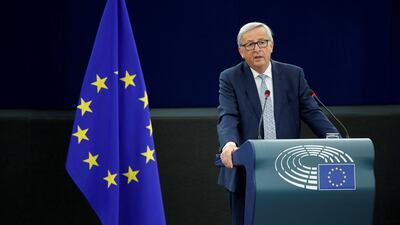Jean-Claude Juncker, president of the EU Commission, delivered a barnstorming state of the union address to the European Parliament on Wednesday, proposing a raft of measures that promise deeper European Union and making such a cursory mention of Brexit that it only came up an hour into his speech.
“We will regret [Brexit],” Mr Juncker said to the wider audience beyond the parliament, and I think [the British people] will regret it too. But we will keep moving. Brexit isn’t everything. It’s not the future of Europe.” Europe now had “the wind in its sails”, and should take advantage of the opportunities offered by Brexit.
He went on to call for a summit to be held in Romania on March 30, 2019, the day after Britain secedes from the Union, at which point the EU could “start its future as 27 [members].”
In a passionate speech, Mr Junker remarked how the last time he had delivered the annual address the continent and its institutions “were not in a good state.” But through maintaining unity, the EU had seen the economic outlook improve enormously.
Growth across the union had outstripped the US for the last two years, and eight million jobs had been created. Mr Junker made special mention of a trade deal with Canada during the last year, and negotiations on deals with Japan, Australia and New Zealand.
Expanding on a theme of guaranteeing greater protection for consumers, he gave German carmakers a ticking off for the Dieselgate scandal, and also committed the Union to leading the global fight against climate change, noting a “reduction in ambition from the United States” (a reference to the US leaving the Paris Climate Accord) that was creating a vacuum Europe would fill.
_______________
Read more:
Brexit: Latest talks end with EU chief negotiator declaring ‘no decisive progress made’
Dreams of a new life start in Sicily as migrants risk all
Brexit was a 'stupid" decision, EU official says
_______________
He also hailed progress made in the migrant crisis; over the last year the number of people entering Europe via the eastern channel through Turkey and Greece had reduced by 97%, while in August numbers coming through Italy — which he singled out for special praise for their “perseverance and generosity” — had gone done by 81% from the same month in 2016.
Noting that Europe was becoming an older continent, Mr Juncker accepted that migration had to continue, and he celebrated the fact that more than 720,000 migrants had made their way legally into the union — “more than three times the combined total accepted by the United States, Canada and Australia.”
At the heart of his speech, which switched from English to French to German, the 62-year-old former prime minister of Luxembourg and past holder of many posts across European institutions, sketched out a version of a future scenario for the EU which he will attempt to implement during the less than two years he has left of his tenure.
“I have always fought for Europe … through thick and thin, never have I lost my love for the EU,” he said.
In a passage which suggested a long-term drive to a far closer union, Mr Juncker vowed to bring member states such as Bulgaria and Romania into the border-free Schengen zone, with Croatia joining too after fulfilling the necessary demands made by the EU for membership.
He also suggested that the future of the union was for all countries to eventually be members of the banking zone, with the euro as the common currency, and also for all to be part of Schengen — a provocative stance which could potentially alienate some states in eastern Europe which currently have right-wing, nationalist governments, such as Poland and Hungary.
And in further moves that will get anti-federalist antennae twitching, he proposed the creation of a Europe-wide finance minister, which would lead to more integration of the Eurozone. This is similar to a proposal made by French president Emmanuel Macron.
Mr Juncker also ruled out membership of the European Union for Turkey in the near future. He attacked the crackdown on press freedom by the regime of Recep Tayyip Erdogan, which has seen French and German journalists arrested.
He also demanded that leaders in Turkey “stop calling our heads of state fascists and Nazis”.

